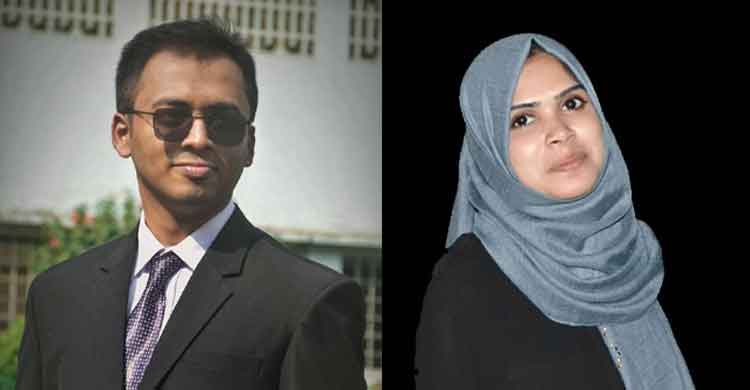An Overview of Fundamental Rights During COVID-19

Ishraque Labib and Nusrat Tayba Mim:
While living in a society or a country, the inhabitants of such society or community are entitled to certain inactions or to perform certain actions or to be in certain states. Such entitlements can be termed as ‘Rights’. Rights are legal, social or ethical principles of freedom. There are some rights which cannot be abridged even by ordinary legislation [1]. Such rights can therefore be termed as fundamental rights when these rights are incorporated into the supreme law of a state. However, in case of a critical situation, such as the pandemic like COVID-19, the government may impose reasonable restrictions detracting the qualified fundamental rights. The ongoing pandemic has even reconfigured the systems and procedures of the legal arena.
Keeping solidarity with international law, such as ICCPR (International Covenant on Civil and Political Rights), IESCR (International Covenant on Economic, Social, and Cultural Rights) etc. as a newly born country, Bangladesh has also incorporated a chapter of fundamental rights in its supreme law – the Constitution.
Chapter III of the Constitution of Bangladesh has introduced certain human rights admitted as fundamental rights also keeping similitude with the International Bill of Human Rights. Equality before law, non-discrimination based on gender, caste, religion, etc., equal opportunity in public employment, prohibition of foreign titles, equal protection of law, right to life etc. are enshrined in part III of the Constitution.
Article 26 (1), 26 (2) have ensured superiority of the fundamental rights above any law as they declare any other law, having inconsistency with the provisions of this part as void and furthermore avert the government from enacting new laws curtailing such rights.
As has been noted in the case of Anwar Hossain Chowdhury vs Bangladesh [2], fundamental rights cannot be taken away or curtailed even by an amendment of the constitution. As stated by the Constitution, the right to move to the High Court Division in breach of a fundamental right is itself a fundamental right [3].
As per the decision of Tayeeb vs Bangladesh, it has been held that judges are bound by their oath to uphold the constitution including fundamental rights of the people guaranteed therein [4]. But both the higher and lower judiciary have remained closed for Covid-19 crisis for more than one month [5]. Legal system and procedures of the legal arena has been proved vastly insufficient to work in the time of this pandemic and new measures have been taken to work using new technologies and systems.
Depending upon Article -102(1),the High Court Division gives remedy on the application of the person aggrieved, the aggrieved person can file a writ petition in the High Court Division. A writ can lie against someone who is performing a public function in connection with the affairs of the country. It is an inclusive term which means that writ can be filed against public bodies [6] as well as private bodies discharging a public function . Nevertheless, when the court was shut off totally, this right of asking for remedy through judicial review was also encumbered. Now, the court has re-opened digitally and the opportunities also re-opened.
Although chapter III of the constitution ensures fundamental rights, not all those rights are absolute. The government can limit some of those rights, i.e. freedom of movement, freedom of assembly, freedom of association, freedom of expression etc. based on reasonable restrictions imposed by law. But what is reasonable has not been defined anywhere, not even in the other statutory laws. Following the High Court Division, reasonableness is justifiable by the Supreme Court and by the two different determiners as to the standard of reasonable classification. First, it should be reasonable in consideration of a prudent and reasonable man. Second, it should be justified by external evidence [7].
The High Court Division has directed the government on March 18,2020 to issue a gazette declaring Covid-19 as a communicable disease [8].
During such medical emergency situations, the local government has imposed restrictions on freedom of movement with a view to imposing such restriction through the Communicable Diseases (Prevention, Control and Elimination) Act, 2018 [9] and schedule 1 of the Rules of Business [10]. On the other side, Article 36 of the Constitution of Bangladesh indicates that every citizen shall have the right to freedom of movement throughout Bangladesh and to reside and settle or leave and re-enter Bangladesh subject to reasonable restriction imposed by law. The ongoing pandemic has created such a situation that the government has to put a reasonable restriction curtailing freedom of movement which has been made permissible for the government only if the restriction imposed is not arbitrary but reasonable.
As COVID-19 is a communicable disease and it can spread out from human to human, restrictions on fundamental rights may reasonably be imposed by the public body, but if such order is arbitrarily made by the government or without reasonable ground, fundamental rights will be breached and accordingly constitutional remedy will lie here.
Thus, even in the time of the pandemic, no one can suspend one’s constitutionally recognized rights except for a proclamation of emergency declared by the President [11].
1. The Constitution of the People’s Republic of Bangladesh, Article 26 (2)
2. 41 D.L.R. (AD) 165
3. Article 44 (1) of The Constitution of the People’s Republic of Bangladesh
4. 4 LNJ AD (2015) 48
5. www.thedailystar.net/coronavirus-outbreak-courts-remain-closed-till-may-16-
6. R vs Panel [1987] QB 815, Marsh v. Alabama, 326 U.S. 501 (1946), Anandi Mukta Sadguru Shree Mukta vs V.R. Rudani & Ors (1989) AIR 1607
7. 34 DLR (HCD) 190 (1982)
8. www.thedailystar.net/online/news/govt-issues-gazette-enlisting-coronavirus-communicable-disease
9. Communicable Diseases (Prevention, Control and Elimination) Act, 2018 (law 61 of 2018)
10. Gazette No- 05.00.0000.173.08.014.07-145, Ministry of Public Administration
11. Article-141A of The Constitution of the People’s Republic of Bangladesh
Writers: Ishraque Labib is currently pursuing LL.B. in University of Dhaka and Nusrat Tayba Mim is currently studying LL.B. in University of Asia Pacific

